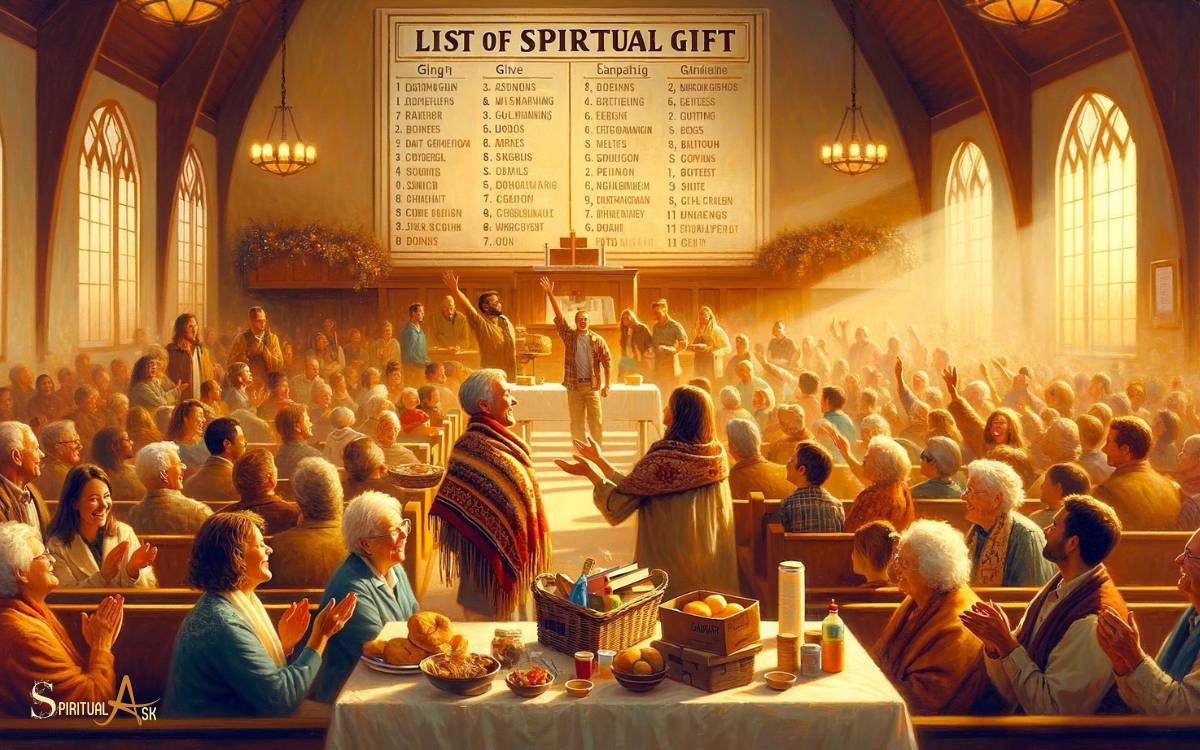List of Spiritual Gifts Baptist: 19 Spiritual Gifts!
Spiritual gifts are special abilities given by the Holy Spirit to believers in the Baptist faith for the benefit and growth of the church.
In the Baptist denomination, spiritual gifts play a vital role in edifying and strengthening the church body. These gifts empower believers to serve others, impact their communities, and glorify God.
Spiritual gifts in the Baptist tradition greatly contribute to the vitality and growth of the church.
They enable believers to serve one another, foster unity, and work collectively to spread the Gospel. Recognizing and nurturing these gifts are essential for a thriving faith community.

Key Takeaway
19 Spiritual Gifts In Baptist
| Spiritual Gift | Description | Bible Reference |
|---|---|---|
| Prophecy | The ability to speak God’s message to others, sometimes foretelling future events or revealing truths. | Romans 12:6, 1 Corinthians 12:10, Ephesians 4:11-12 |
| Serving | The capacity to identify and meet the practical needs of others, often behind the scenes. | Romans 12:7, 1 Peter 4:10-11 |
| Teaching | The skill to study and understand God’s Word, and to communicate it effectively to others. | Romans 12:7, Ephesians 4:11-12 |
| Exhortation | The gift of encouraging, motivating, and challenging others to grow in their faith and obedience. | Romans 12:8 |
| Giving | The ability to generously and cheerfully contribute one’s resources to meet the needs of others or support God’s work. | Romans 12:8, 2 Corinthians 9:6-8 |
| Leadership | The ability to guide, inspire, and direct people toward the accomplishment of God’s purposes. | Romans 12:8, 1 Timothy 3:1-7 |
| Mercy | The gift of showing empathy, care, and compassion to those in need or suffering. | Romans 12:8, James 3:17 |
| Wisdom | The ability to understand and apply spiritual truths to life situations in a practical way. | 1 Corinthians 12:8, James 3:17 |
| Knowledge | The gift of understanding deep, complex, or hidden truths in God’s Word or creation. | 1 Corinthians 12:8, Colossians 2:2-3 |
| Faith | The ability to trust God with extraordinary confidence, inspiring others to do the same. | 1 Corinthians 12:9, Hebrews 11:1 |
| Healing | The ability to bring physical, emotional, or spiritual healing to others through prayer or touch. | 1 Corinthians 12:9, 28, James 5:14-16 |
| Miracles | The capacity to perform extraordinary acts that demonstrate God’s power and presence. | 1 Corinthians 12:10, 28 |
| Discernment | The ability to distinguish between truth and error, or between good and evil in spiritual matters. | 1 Corinthians 12:10, Hebrews 5:14 |
| Tongues | The ability to speak in a language not known by the speaker, for the purpose of edification, prayer, or prophecy. | 1 Corinthians 12:10, 28, Acts 2:4-11 |
| Interpretation of Tongues | The ability to understand and communicate the meaning of a message spoken in tongues. | 1 Corinthians 12:10, 30, 14:13 |
| Apostleship | The gift of pioneering new ministries, planting churches, and equipping leaders to carry out God’s mission. | Ephesians 4:11-12, 1 Corinthians 12:28 |
| Evangelism | The ability to effectively communicate the gospel to nonbelievers, leading them to faith in Christ. | Ephesians 4:11-12, Acts 8:26-40 |
| Shepherding | The gift of guiding, nurturing, and protecting the spiritual well-being of a group of believers. | Ephesians 4:11-12, 1 Peter 5:1-4 |
| Hospitality | The ability to welcome and care for others, providing a warm and friendly environment. | 1 Peter 4:9, Romans 12:13 |
Understanding Spiritual Gifts
Spiritual gifts are divinely endowed abilities given to believers, intended to strengthen the church and foster unity within the Christian community.

These gifts, as outlined in key New Testament passages, include a range of functions and services that are crucial for the health and growth of the church. You’ll find that the identification and deployment of these gifts are central to Baptist theology and practice.
Analytically, spiritual gifts serve multifaceted purposes. They are not just for personal edification but are designed to benefit the collective body of Christ.
Each believer is believed to possess a unique contribution, which, when harmoniously combined with others, leads to a robust and effective ministry.
Understanding your spiritual gifts is pivotal in contributing to the church’s mission and in experiencing personal spiritual fulfillment.
The Gift of Prophecy
Within the Baptist tradition, the gift of prophecy is understood as a divinely inspired capacity to proclaim truths that edify, exhort, and console the Christian community, often revealing deeper insights into God’s will.

This gift is not about foretelling the future but discerning and communicating God’s message in the present context.
Here are key aspects of this gift:
- It serves to build up the church by encouraging and strengthening the faith of believers.
- Prophecy can provide correction and guidance, aligning the community with biblical teachings.
- It may unveil aspects of God’s character and plans, enhancing understanding.
- This gift should be exercised under the accountability structures within the church.
- It is subject to evaluation by church leadership to ensure alignment with Scripture.
The Ministry of Service
The ministry of service, often referred to as the gift of helps, empowers believers to selflessly assist and support others within the church community, thereby fulfilling the practical needs of the body of Christ.

You’ll find that this gift is foundational to the harmonious functioning of the church. It manifests in a variety of actions, from administrative tasks to hospitality, all aimed at undergirding and strengthening the communal fabric.
Analyzing its significance, the ministry of service is not merely auxiliary; it’s integral to congregational life. As you exercise this gift, you’re often the glue that holds ministries together, reflecting Christ’s servant-hearted nature.
Your acts, though sometimes unseen, are invaluable a tangible expression of love that echoes throughout the community, nurturing unity and enabling the effective operation of other spiritual gifts.
The Art of Teaching

Building on the foundation of selfless service, it’s essential to recognize that teaching is another pivotal spiritual gift that enables the dissemination of biblical knowledge and wisdom throughout the Baptist community.
As you explore this gift, consider the following analytical points:
- Teaching transcends mere information transfer; it involves shaping character and faith.
- Effective teaching requires an understanding of diverse learning styles within the congregation.
- Biblical literacy is a core goal, achieved through systematic and contextually sensitive instruction.
- The spiritual gift of teaching is authenticated by the teacher’s adherence to scriptural truth.
- The transformative power of teaching hinges on the application of biblical principles to everyday life.
The art of teaching within the Baptist faith is, therefore, not merely an academic exercise but a sacred responsibility to guide believers toward spiritual maturity.
The Calling of Exhortation
You must first grasp the core of exhortation, which is a spiritual gift that enables you to encourage and urge fellow believers towards spiritual growth and a deeper walk with God.

Investigating the role of exhortation within community life reveals its significance in fostering a supportive and motivating environment.
To effectively nurture this gift, you should explore various practices that enhance your exhortatory ability, ensuring that it aligns with scriptural teachings and the needs of your community.
Understanding Exhortation’s Essence
Exhortation, as a spiritual gift within the Baptist tradition, empowers individuals to encourage and uplift others through persuasive discourse that nurtures spiritual growth and resilience.
As you delve into this gift, it’s crucial to grasp its core characteristics:
- Motivational: It spurs believers toward moral and spiritual betterment.
- Consolatory: Provides comfort in times of sorrow or distress.
- Counseling: Offers wisdom and advice grounded in Scriptural truth.
- Corrective: Gently reproves and guides towards righteous living.
- Encouraging: Bolsters faith and instills hope in challenging circumstances.
Understanding exhortation’s essence means recognizing its multifaceted role in fostering a supportive community. It’s a call to be a beacon of inspiration, guiding others towards a deeper connection with their faith and the church body.
Exhortation in Community Life
Having established the fundamental aspects of exhortation, it’s essential to consider its pivotal role in the dynamics of community life within the Baptist church.
As you delve deeper, you’ll find that exhortation serves as a binding force, fostering unity and edification among believers. It’s not merely about encouragement; it’s a call to action, prompting members to live out their faith actively.

Within your community, those gifted with exhortation are instrumental in guiding others towards spiritual maturity. They provide counsel, comfort, and correction with sensitivity and scriptural wisdom.
These individuals help to maintain the church’s collective focus on Christian principles, ensuring that the congregation doesn’t just grow in numbers, but also in depth of conviction and commitment to the Gospel’s message.
Cultivating Exhortatory Practice
To cultivate a practice of exhortation within the Baptist community, individuals must recognize and respond to the unique calling this spiritual gift represents.
The cultivation of this gift involves a rigorous process, emphasizing the need for:
- Intentional study of scripture to understand the foundations of faith.
- Regular prayer for wisdom and sensitivity to the Holy Spirit’s guidance.
- Development of active listening skills to address the specific needs of others.
- Practice of delivering messages that are both encouraging and challenging.
- Seeking feedback and mentorship from experienced leaders to refine one’s exhortatory abilities.
The analytical approach to cultivating exhortation underscores its significance in edifying the church body. It’s imperative that you, as a potential exhorter, approach this practice with diligence and a heart attuned to service.
Contributions and Generosity
You must examine how the spiritual gift of giving manifests within the Baptist tradition, noting its significance in fostering a culture of charitable living.

Assess the theological underpinnings that encourage believers to contribute generously, and the potential ripple effects these actions may have on the wider community.
Your analysis should distinguish between mere acts of charity and the intentional, faith-driven generosity that characterizes this spiritual gift.
Embracing Charitable Living
Embracing charitable living calls for a steadfast commitment to generosity, reflecting a deep-seated belief in the transformative power of sharing one’s resources and blessings with others.
This perspective is not merely idealistic; it’s grounded in a nuanced understanding of the multifaceted nature of charity.
Consider the following dimensions:
- Resource Allocation: Efficient distribution of resources maximizes impact.
- Intentionality: Genuine motives enhance the value of giving.
- Sustainability: Long-term support over transient aid fosters enduring change.
- Community Building: Collective action strengthens social bonds.
- Equity: Mindfulness in giving promotes fairness and inclusivity.
Your approach to charitable living should be informed by these principles. It’s not just about what you give, but how you give, ensuring that your contributions resonate with purpose and propel meaningful progress.
Spiritual Gift of Giving
Building on the foundation of charitable living, it’s crucial to recognize the spiritual gift of giving as a distinct manifestation of generosity that compels individuals to contribute resources selflessly and with a heartfelt desire to benefit others.

This gift transcends mere philanthropy; it is an intrinsic quality that prompts you to prioritize the needs of others and to use your material possessions as a means of expressing your faith and commitment to the teachings of the Baptist church.
The spiritual gift of giving is not merely an act but a way of life that evidences a profound understanding of stewardship and community interdependence.
It’s this gift that often fuels the church’s ability to provide for the needy and to fund its missions, reflecting a tangible expression of divine love and grace.
Impact of Generous Actions
Generous actions spark a cascade of positive outcomes, both for the recipients and the broader faith community, reinforcing the Baptist belief in the transformative power of selfless giving.
This ethos is deeply embedded in Baptist tradition, emphasizing the impact of contributions and generosity. When you engage in selfless acts, you’re not just helping others; you’re fostering a spirit of communal support and empathy.
Consider the following:
- Strengthening bonds within the community
- Encouraging a culture of mutual aid and support
- Fostering spiritual growth among individuals
- Providing resources for ministry and outreach
- Demonstrating the tangible love of God through action
Your generous actions are not merely charitable deeds; they’re investments in the spiritual and material well-being of your community, resonating with the core values of Baptist teachings.
Leadership and Governance
Within the context of Baptist traditions, leadership and governance represent pivotal spiritual gifts that are essential for the effective administration and stewardship of church resources and congregational guidance.

You must recognize that these gifts are not merely organizational skills but are divinely bestowed capacities for guiding the church in its mission and spiritual journey. They require discernment, wisdom, and a servant-hearted approach.
As a leader within the Baptist church, you’re called to exercise your gift with humility and integrity, fostering unity and facilitating the spiritual growth of the congregation.
Governance, similarly, is not about wielding power but ensuring that the church’s operations align with its doctrinal beliefs and the collective vision of its members. These gifts, therefore, play a critical role in the vitality and longevity of the church community.
What are the 19 spiritual gifts recognized by the Baptist denomination?
Baptists’ spiritual gifts belief emphasizes the variety of gifts bestowed by the Holy Spirit to individuals for the edification of the church and the broader community.
While there may be some variation in how different Baptist groups identify or emphasize these gifts, a commonly recognized list includes:
- Administration
- Apostleship
- Discernment
- Evangelism
- Exhortation
- Faith
- Giving
- Healing
- Helps/Service
- Hospitality
- Knowledge
- Leadership
- Mercy
- Prophecy
- Shepherding
- Teaching
- Tongues (and interpretation of tongues)
- Wisdom
- Miracles
Note: This list represents a broad spectrum of gifts that Baptists believe are distributed among believers by the Holy Spirit. The actual emphasis and recognition of these gifts can vary within the denomination, reflecting the diverse nature of Baptist beliefs and practices.
Conclusion
Well, aren’t you blessed? With this divine toolkit, you’re practically a spiritual Swiss Army knife. Prophecy, service, teaching—heck, you’re the full package.
Just remember, with great power (or generosity, or leadership) comes great… well, let’s hope responsibility, not an inflated ego.
Use these gifts wisely, oh chosen one, lest your halo starts to feel a tad too tight. After all, it’s not every day you get to channel the divine while balancing a budget or herding the proverbial church cats. Amen to that!
FAQ About List of Spiritual Gifts Baptist
What are the spiritual gifts Baptist believe in?
Baptists believe in the spiritual gifts of faith, hope, evangelism, service, teaching, healing, miracles, apostleship, hospitality, leadership, giving, and prophecy.
How does one discover and use their spiritual gifts?
Baptists believe that the Holy Spirit bestows spiritual gifts to the faithful. To discover and use them, individuals must trust in God’s leading and make prayerful decisions about how to serve the communities around them.
What are the roles of spiritual gifts in relation to the Church?
Spiritual gifts are essential to building up the Church and in sharing God’s love and faith with others. They help foster a collective spirit of worship and donations and strengthen the overall mission of the Church.
How can spiritual gifts be used to bring about good in the world?
Spiritual gifts can be used to bring people together and to do good works in the communities that they serve. They can be directed toward creating meaningful fellowship among strangers, offering relational and monetary support to those in need, and inspiring people to perform acts of faith and goodwill.






